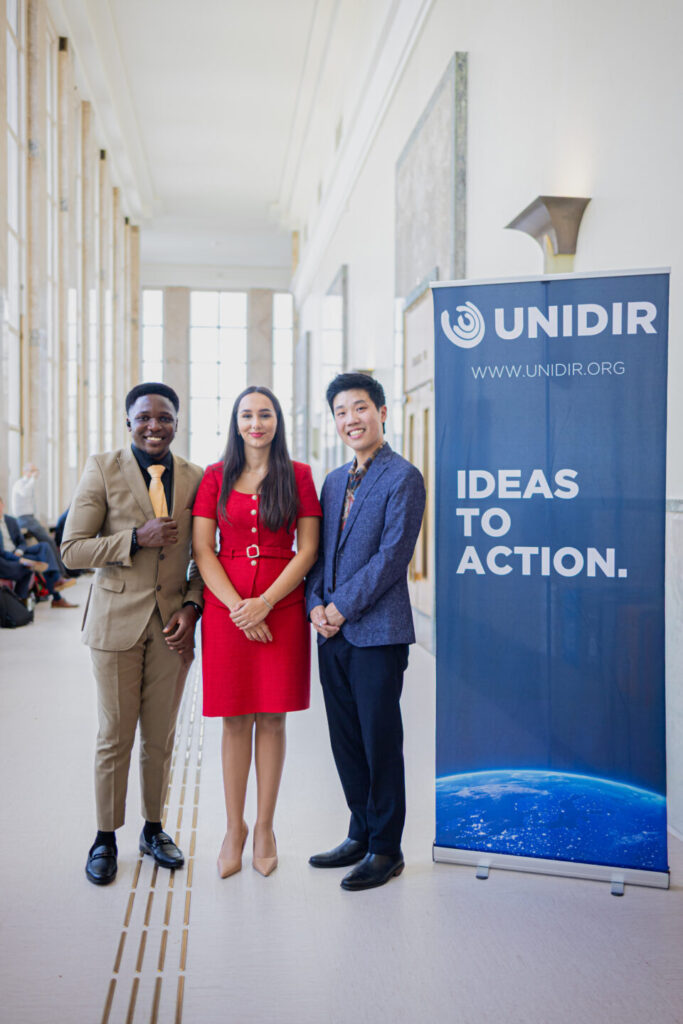UNIDIR, together with the Centre for International Governance Innovation (CIGI), launched the second iteration of its youth video competition as part of the Outer Space Security Conference 2025.
Aiming to strengthen youth inclusion in multilateral space security efforts, UNIDIR’s and CIGI’s video campaign invited young people worldwide to share their perspectives on future challenges in space security. This year’s competition received four times more submissions and engagement, with insightful and innovative videos from all over the world. This significant increase reflects the rapidly growing interest in space security issues among young people, but also the importance of including the next generation in space security discussions.
Youth voices on tomorrow’s challenges
The video competition invited youth aged 18-25 to reflect on the future challenges and solutions in space security, by asking them to imagine themselves as future leaders and decision-makers.
It’s the year 2050. You work on outer space security, shaping space governance as a treaty negotiator, orbital traffic controller, policy advisor, infrastructure inspector – or something else entirely. What challenge do you face and how are you responding?
The campaign drew submissions from young people globally, representing diverse backgrounds, academic disciplines, cultures, and interests. Their contributions offered insights on some of the most pressing space security challenges faced by the next generation.
Spotlight on this year’s youth leaders
Given the surge in global engagement, the competition was expanded from three to four winners. All entries were reviewed by a panel of independent experts from UNIDIR and CIGI, serving in their personal capacities. Judges applied the same set of established criteria to every submission, ensuring a fair and equitable evaluation process. The four selected videos offer compelling perspectives on the future of space security and were showcased at the Outer Space Security Conference 2025 in Geneva, Switzerland. This year’s youth video competition winners are:
Emily Karakoleva, International Relations Student, American University in Bulgaria
Emily Karakoleva was appointed Bulgarian Youth Delegate for 2024–2025, the youngest to hold the role. As part of this assignment, she delivered Bulgaria’s national statement at the UN Commission for Social Development and spoke at the 2025 ECOSOC Youth Forum on youth-led innovation and sustainability. Emily has also been actively involved in other initiatives to promote youth rights and inclusion, for example representing Bulgaria at the UNICEF Global Forum for Children and Youth. Emily begins her International Relations studies at the American University in Bulgaria this fall.
Drawing on her experience as a young actor of change in advocacy and policy, Emily’s video raises how we can avoid replicating the injustices on Earth in space and the need for transparency, equity and youth inclusion in space policy.
Andre Kwok, Space Law and Space Security Researcher
Andre Kwok is a Space Law and Space Security Researcher with a particular interest in space diplomacy in the Asia-Pacific region. With degrees in Law and Asian Studies from Australian National University, he is currently a researcher at the Australian Centre for Space Governance. Andre has a background in criminal law and domestic prosecutions of international crimes and has served as a legal consultant to the UN Assistance to the Khmer Rouge Trials. Previously, he was also a Westpac Scholar to National University of Singapore.
Stepping into the shoes of a space diplomat in the Asia Pacific region, Andre’s video highlights the regional and local perspective by suggesting regional diplomatic networks for space issues and educational measures to strengthen “space literacy” for all.
Adeboye Oluwafemi Malumi, Law Graduate, University of Benin, Nigeria
Adeboye Oluwafemi Malumi is a recent Law Graduate from the University of Benin in Nigeria, with a strong interest in international law, public policy, and global governance. He has represented his university in major national competitions, serving as Chief Speaker and leading his team to the semi-finals of the 2024 Leap Africa Policy Debate Competition. Adeboye’s creative work has received international recognition, including finalist placements in the JCSI Young Creatives Awards and the Doyle Edeni Prize for Short Fiction.
Addressing the difficulties of law and enforcement in ungoverned spaces, Adeboye’s video suggests new frameworks for strengthening orbital control, international transparency and state accountability in space.
Kondwani Mbale, Artificial Intelligence Student, Morocco
Kondwani Mbale is a young innovator from Zambia, who is currently studying artificial intelligence in Morocco. His journey began in robotics through Zambia Robotics, where he represented his country at international competitions such as the FIRST Global Challenge, and later he joined the EO Robotics Lab and the NextGen@ICANN programme, where he presented on the role of AI in internet governance. Kondwani was also named a laureate in the International Youth Competition for Scientific and Sci-Fi Works by the Center for Modeling the Future.
Kondwani’s video envisages how he, as a future Zambian space policy advisor at the UN Office for Outer Space Harmony, would prevent escalation by addressing challenges of orbital collisions, the state-private dimension of space security, and AI driven decision making.
Continued support for youth inclusion in space security
The Outer Space Security Conference video campaign testifies to the growing youth engagement in the sphere of space security and the need to consider and include their perspectives. Despite the Outer Space Treaty establishing that space should be used in the interests of all countries, irrespective of economic and scientific development, there is still a need to advance global representation and youth inclusion. Therefore, UNIDIR stays committed to this goal and will continue its efforts to amplify the voices of young people in policy discussions and research related to space security.

